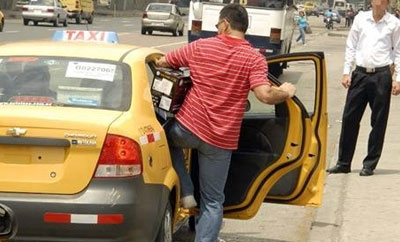While Colombia registered a drop in kidnappings in 2013, an uptick in “express” kidnappings remains obscured by the statistics, and reflects a major shift in the country’s crime dynamic.
Among 45 kidnappings committed in 2014 and 299 registered in 2013 by Colombia’s Defense Ministry, a pattern can be seen of short captivity periods in which the perpetrators demand relatively small sums of money, reported El Colombiano. General Humberto Guatibonza, commander of the GAULA anti-kidnapping unit of the police, said both common criminals and guerrillas were increasingly resorting to “express kidnapping” methods.
In February, El Tiempo reported there had been 16 cases of this form of kidnapping in 2014, particularly concentrated in the departments of Tolima, Arauca, Huila and Cundinamarca, and in the country’s Coffee Region. Victims were held for just hours, and their families paid between $2,500 and $5,000 for their release.
According to official figures, the bulk of 2013 kidnappings were committed by common criminals, followed by the Revolutionary Armed Forces of Colombia (FARC). Maria Consuelo Jauregui, director of NGO Fundacion Pais Libre, expressed concern over an increase in kidnappings by the National Liberation Army (ELN) in the oil rich Arauca department bordering Venezuela in 2013, reported El Colombiano.
InSight Crime Analysis
Kidnapping numbers have dropped dramatically in Colombia in the past decade, from 2,123 in 2003 to 305 by 2012. The fall is reflective of the country’s shifting conflict dynamics and criminal landscape, which has seen a rise in small criminal groups dedicated to extracting local profits through micro-trafficking, micro-extortion and kidnapping.
Where guerrillas were once the principal perpetrators of the crime, their involvement has been diminished in part by security forces initiatives. Kidnapping has also become politically harmful for the FARC, who promised to halt the crime during peace talks in 2012. While it is clear this has not been fully respected, with a case last year indicating they were sharing victims with the ELN — who have made no such promise — it is now low-level criminals responsible for much of the trade.
SEE ALSO: Coverage of Kidnapping
This is seen in the shift towards express kidnappings, which can be as quick and simple as what is known as a “paseo millonario” (millionaires ride), in which perpetrators jump into a taxi and force the passenger under threat of violence to go to the nearest ATM and withdraw money from their account. The case of a US Drug Enforcement Administration (DEA) agent murdered last year in Bogota during such an express kidnapping highlighted this modality.
Because express kidnappings blur the lines between robberies and traditional kidnappings — carried out over long periods to raise significant sums, or motivated by non-monetary demands — the extent of the crime is not reflected in official statistics, meaning Colombia’s kidnapping numbers fail to reveal the true scope of the crime.

